Welcome To ChemAnalyst

The long-term outlook reveals potential challenges for the European Carbon Black market due to multiple factors, including sanctions imposed by the European Union on Russia and supply constraints.
In the upcoming year, the European Union's sanctions against Russia, in response to the conflict in Ukraine, will result in an import ban on Carbon Black starting from July 1, 2024. This ban will force nations reliant on Russian imports to seek alternatives. The potential markets can be China, Germany, South Korea, and the United States. As a result, prices for importing countries are expected to rise, impacting the overall European market.
Furthermore, Russia's plans to reduce oil production as part of its efforts to distance itself from countries involved in oil cap principles will affect oil prices. If oil prices rise in Russia, it could bring stability to the country's Carbon Black market. However, various market constraints, including harmful emissions during production and stringent government regulations, continue to hamper the demand for Carbon Black, leading to slow market expansion.
In May 2023, market participants in the Netherlands reported rising Carbon Black prices, with an overall increase of around 1.8% in the first week. Meanwhile, supply dynamics faced some constraints, despite rising consumption in European countries such as Germany, Turkey, and the Netherlands. In the United States, Carbon Black export prices stabilized after a continuous decline, with the market struggling due to underwhelming output from downstream industries, particularly automotive.
According to ChemAnalyst, stable procurement activities are expected in European nations such as Germany and the Netherlands, and the United States. However, cost pressures from feedstock Natural Gas are anticipated to remain firm. While the decline in oil production in Russia may stabilize oil prices and offer some stability to the Russian Carbon Black market, it is expected that prices for Carbon Black will shift balance into the second half of 2024 due to limitations on Russian imports into the European countries. This could impact the availability of Carbon Black and Synthetic rubbers in the European market, particularly as the automotive industry shows signs of improvement.
Despite the uncertainties and challenges faced by the European Carbon Black market, the strong demand from various industries and potential stability in the Russian market may contribute to stable prices in the upcoming quarters. However, the market should brace for potential price increases in Carbon lack and Synthetic Rubbers as the European automotive market continues to recover.
We use cookies to deliver the best possible experience on our website. To learn more, visit our Privacy Policy. By continuing to use this site or by closing this box, you consent to our use of cookies. More info.
